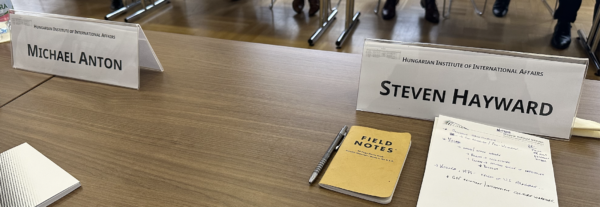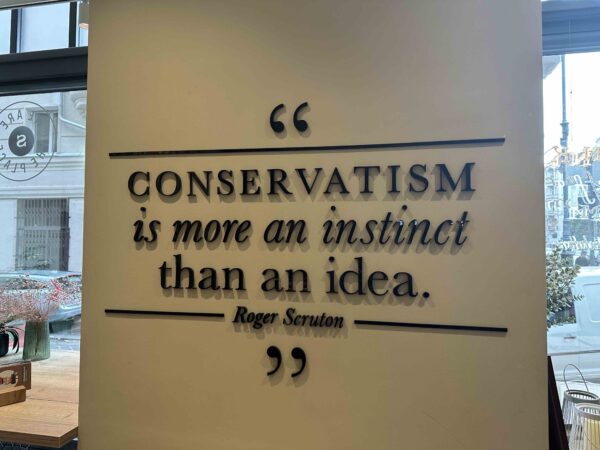
Whoever’s on the other side of the table is in trouble! (And David Goldman is to our left, out of frame.)
BUDAPEST, September 25: I’ve been so overbooked in Budapest that I haven’t had time to file any foreign dispatches, and I have a lot to catch up on.
I spent most of Saturday at a small roundtable convened by the Hungarian Institute of International Affairs, which was devoted to exploring American and Hungarian perspectives on a variety of issues. The meeting was off-the-record and under Chatham House rules, so I can’t say who was in attendance (beyond my mischievous pic above), and offer any attributed direct quotes. I’ll say simply that the Hungarians in attendance were well-placed individuals and very smart and savvy about both American and European politics.
One of the Hungarians remarked that “Hungary’s government is very pro-American and pro-Western civilization,” which prompted me to offer that it would be nice if the current American government was pro-American and pro-Western civilization. They were extremely diplomatic in characterizing the open hostility of the Biden Administration to Hungary at the moment. Biden’s ambassador to Hungary is David Pressman, a gay man who likes to march with his male spouse in the rare pride parades that take place here. But as one of the sage Hungarians observed, it may not be a bad thing politically for Viktor Orban’s Fidesz Party to have the unpopular American president in open opposition; in this respect our ambassador Pressman is a political gift to Orban.
The Hungarian government is in regular dialogue with the American government, but these dialogues were characterized as “correct,” which is diplo-speak for formal or stiff. No wonder Orban told Tucker Carlson recently that the U.S. should “bring back Trump.” Very rare for a foreign leader to take open sides in an American political contest, but it is an indication that Orban sees no political downside to pushing back directly against an openly hostile American administration. (Among other things, the Biden Administration unilaterally canceled a Hungarian-American tax treaty, for no good reason other than its hatred of Hungary’s government.)
Ukraine received considerable discussion, as might be expected. One general complaint went as follows: We Hungarians are tired of being called “Russian agents” when we ask questions about the European Union or the Ukraine war, and while we are pro-American, we aspire not to be understood as a mere vassal or proxy of the United States. Seems to me they are right that their independent views deserve to be respected.
But everyone needs to start by understanding just what those views are. It is not true, as is widely claimed in the United States, that Hungary is pro-Putin. First, Hungarians don’t have any great fondness for either Ukraine or Russia; Ukraine hasn’t been exactly a friendly neighbor to Hungary over the centuries, and Ukraine gladly took some of Hungary’s involuntarily-ceded territory in the shameful Trianon Treaty after World War I, so claims of “territorial integrity” generate mostly a snort here. And the memory of the Soviet Union crushing the anti-Communist revolution of 1956 runs very strong.
It is said that Hungary is treading a mixed line because of its heavy dependence on Russia for natural gas, which is true, but one of our Hungarian interlocutors politely noted the hypocrisy of the United States criticizing Hungary for its Russian gas dependence while we negotiate with Venezuela for oil supplies. Incidentally, Hungary has been trying to diversify its energy supply, and built a new gas pipeline to Slovakia not long ago. But guess where Slovakia was sourcing gas to transship to Hungary? Additionally, Hungary has recently taken steps to decouple from Russia for nuclear fuel for its nuclear power plants. None of these changes can happen on a dime, especially for a small landlocked nation.
This leads to the second main point: while Hungary would prefer to see Ukraine prevail, Hungary thinks this is a war that neither side can win outright. And they have doubts that the United States (or the European Union) will see it through, given our recent track record in Afghanistan and longer memories of Vietnam, Lebanon, Somalia, etc. Historical memory is very strong here. They doubt the U.S. has thought through the possible unintended consequences of its open-ended Ukraine commitment, and from their point of view the U.S. seems unwilling even to discuss it with anyone. Having been occupied so many times over the centuries, Hungary is no longer going to believe foreign promises. Our Hungarian hosts were too polite to note the ironically-named Budapest Memorandum of 1994 in which we guaranteed Ukraine’s security in exchange for Ukraine giving up its nuclear arsenal. They didn’t need to remind us of that. The closest they came was the comment, “The U.S. can go home, but Ukraine will still be our neighbor.” And to the Ukrainians, Hungary has been reminding of our Vietnam and Afghan withdrawals, asking: “Will a helicopter come for you? And the answer is clear: ‘No.'” The Kurds in Iraq from 1991 might have a thing or two to say about this.
One reason Hungary called for a negotiated settlement early on is a deep understanding of the Russian character. As one Hungarian put it to us, “If Russia loses this war in the field and is pushed out of Ukraine, it will spend 50 years preparing revenge against the West.” We should not think for a moment that the death of Putin, or a coup in Russia, will change their historic imperial instincts. If you want to understand why Russia has pursued this self-damaging course, just go back to the old story of the frog and the scorpion.
 The issue of China came up for extended discussion, too. One of our delegation suggested to our hosts: “Hungary was dragged into World War I by Austria, and lost. It was dragged into World War II by the Germans, and lost. If Hungary decides to take sides in a U.S.-China war, whichever side it chooses will likely be the loser, so you’d be better off staying out of this one.”
The issue of China came up for extended discussion, too. One of our delegation suggested to our hosts: “Hungary was dragged into World War I by Austria, and lost. It was dragged into World War II by the Germans, and lost. If Hungary decides to take sides in a U.S.-China war, whichever side it chooses will likely be the loser, so you’d be better off staying out of this one.”
Meanwhile, I am getting lots of quality time at Cafe Scruton—there are THREE of them in town—and pondering the idea of franchising them in the U.S. and seeing if it couldn’t be a rival to Starbucks.
Also, Hungarian wine is excellent, offering some unique varietals and also subtle shadings on the familiar varietals such as Cabernet Franc and Syrah. But very little is exported chiefly because very few wineries here do sufficient volume to make it pencil out. So maybe “someone” ought to organize a consortium of boutique Hungarian wines for export to the U.S. Hmmmm.




Notice: All comments are subject to moderation. Our comments are intended to be a forum for civil discourse bearing on the subject under discussion. Commenters who stray beyond the bounds of civility or employ what we deem gratuitous vulgarity in a comment — including, but not limited to, “s***,” “f***,” “a*******,” or one of their many variants — will be banned without further notice in the sole discretion of the site moderator.